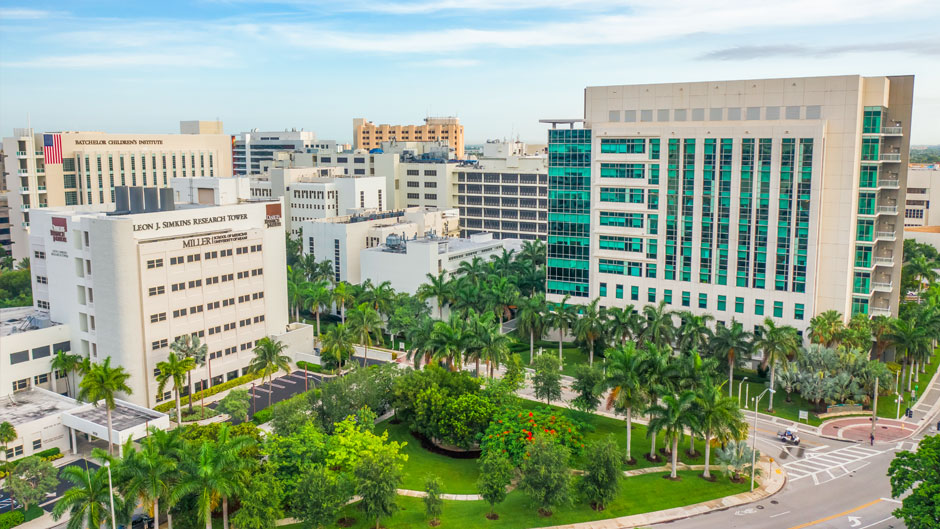University of Miami medical experts used a virtual forum on Tuesday evening to correct the rash of misinformation circulating, particularly on social media, that has contributed to hesitancy among a portion of the population to get the COVID-19 vaccine—even as the coronavirus and its variants continue to spread and spike.
Dr. Roy Weiss, the University’s chief medical officer for COVID-19; Dr. Stefanie Brown, an associate professor of Pediatric and Internal Medicine and member of the COVID-19 task force; and Dr. Olveen Carrasquillo, chief of the Division of Internal Medicine and a co-leader of one of the clinical trials, participated in the conversation, “COVID-19 Vaccine: Fact vs. Fiction.” Some 450 people registered for the town hall.
Weiss highlighted the effectiveness of vaccines over time for eradicating a number of diseases, among them polio, diphtheria, and smallpox.
“Yet the success of a vaccine problem depends on the acceptance of the population and the availability of the vaccine,” he said. “We’ve done pretty well with providing the availability.” Weiss used a series of charts to show the benefit that increased vaccinations would have on reducing the threat of the virus and its variants within the United States.
As of May 5, CDC reports indicate that more than 148 million people in the United States 18 or older have received at least one dose of a COVID-19 vaccine, or 44.7 percent of the total adult population, and more than 107 million, or 32.3 percent of the population, have been fully inoculated. And vaccines are nearing approval for children 12 and older.
The trio of experts shared from both their extensive professional knowledge of disease and disease prevention and, at times, from their personal perspective—each have been vaccinated and have encouraged their loved ones to do so.
“I was one of those people who had some questions early on about the vaccine,” said Brown. “Then, I realized that the trials were done well and in a good manner and, most importantly, I wanted to see my mom, who is 79. That was my big reason—wanting to see and visit with my family, and to do that safely.”
Carrasquillo, who is leading a state-wide coalition to address vaccine hesitancy, noted that the contributing factors—complacency, confidence, and convenience—are varied and complex. He pointed to social media, and the proliferation of misinformation circulating there, that has been particularly responsible for undermining public confidence in vaccine safety.
“There’s an overabundance of information out there—what’s referred to as ‘the COVID infodemic’—and it makes it hard for people to know what the truth is,” he said. “There are many false and misleading stories that are fabricated and with social media anyone can write and publish on the web—that’s what’s really driving this.”
The misinformation has fueled mistrust and fear which is associated with well-known historical abuses, financial strain caused by a once-faltering economy, and societal politicization of the COVID-19 crisis, the Miller School physician explained.
The health experts said they have made inroads by working with trusted community partners—especially pastors, ministers, and clergy within different ethnic communities—to address misconceptions and concerns regarding the vaccine.
“We’ve seen hesitancy dropping, but there’s still a solid 20 percent that’s hard to crack,” Carrasquillo said.
Weiss noted that the decision has not yet been made whether University faculty members, employees, and health-care workers will be required to have the vaccination. Based on the recent executive order by Florida Gov. Ron DeSantis, students cannot be given a mandate.
“However, rather than mandate the vaccines, there are many public health leaders who believe that the carrot is better than the stick,” Weiss said. “We are fortunate to have UM President Julio Frenk, a public health expert, leading us through the pandemic.”
To this point, Weiss highlighted the advantages of decreased testing frequency, the ability to travel more openly—no need to isolate or quarantine for domestic travel—schools opening for vaccinated students, and many aspects of society opening safely for those who are vaccinated.
Questions ranged from, “what’s the best vaccine to get?”—the first one you can—to “should I get the vaccine if I’ve already been infected with the virus?”
“We recommend that even people who have gotten infected should get the vaccine because the variable degree of the infection is not nearly as strong as if someone got the vaccine,” said Weiss, adding that an antibody test is being developed that will soon help to confirm immunity after the vaccine.
To a question regarding the potential impact of the vaccine on preventing pregnancy, Brown noted that it’s still early, but so far, there has not been any documented adverse effect.
What’s the best approach to encourage someone through their hesitancy?
“Engage them in a dialogue—ask them what they’re afraid of, where they’re getting their information, if their information source is reliable,” Carrasquillo suggested. “Some people are really scared right now. So, it’s best to have a conversation based on their understanding and beliefs.”
“You can’t intellectualize it too much, and you can’t rationalize passion and beliefs,” Weiss said. He pointed to Dr. Brown’s story—of choosing to get vaccinated so she could hug her mother—as a great example to proffer to those who are reluctant to get vaccinated.
“For those of us that haven’t been close to our families for over a year,” Weiss continued, “the biggest carrot you can put in front of people is to make them know that not only are they making themselves safer, but they’re making their loved ones safer by getting vaccinated—that’s one of the strongest pieces of evidence we can use.”
Email covidcmo@miami.edu with questions or visit the UHealth website, UMiamiHealth.org/vaccine for more information.

